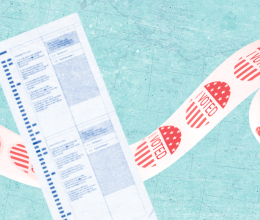Our long-fought voter purge case – APRI v Husted - finally came to a favorable conclusion on August 29, 2019. Since it was long, here’s a brief history:
- We filed suit in early 2016 challenging Ohio’s practice of purging voters for failure to vote. Our complaint had two counts: (1) that the purge process itself was unlawful because the National Voter Registration Act (“NVRA”) forbids purging for failure to vote, and (2) that, even if Ohio’s purging were lawful, the hundreds of thousands -- to millions -- of Ohioans who had been purged over the years had not been purged properly because the notice card that they had been mailed did not comply with the requirements of the NVRA.
- We lost in the trial court, but the 6th Circuit Court of Appeals ruled in our favor. At that time, the 2016 presidential election was about to occur, so the district court provided a remedy - which was supposed to be temporary while the rest of the case played out. The remedy was a process whereby voters who had been purged, even though they were no longer registered, could vote provisionally and, if they still lived at the address where they had registered, their provisional ballot would count. This remedy was referred to by the Secretary of State (and then everyone else) as the “APRI Exception.” About 7,000 purged Ohioans were able to have their votes counted in the 2016 Presidential election, thanks to the APRI Exception.
- The Supreme Court ruled 5-4 on our Count I in 2018 that Ohio’s Purge was not a violation of the NVRA because, the way the majority rationalized it, it purges people for failing to respond to a notice, rather than for failing to vote. (Even though the notice is triggered by a failure to vote.)
- That left Count II to be litigated. We lost on Count II in the trial court just before the 2018 election, but we quickly filed an emergency appeal to the 6th Circuit, and obtained an extension of the APRI Exception so that Ohio voters who had been purged could vote in the upcoming election.
- The Secretary of State voluntarily continued the “APRI Exception” while the 6th Circuit appeal continued to be litigated. Similarly he voluntarily implemented several reforms – such as mailing out “last chance” notices to voters who were on the brink of being purged. Ultimately, after many, many months, finally over the last few days, we were able to reach and execute an agreement, settling the case on terms that are very favorable to Ohio voters.
The main provisions of the settlement can be summarized as follows:
- The “APRI Exception” will now continue through the end of 2022. It will also be expanded to include more voters, including those who had last voted in 2007 (who had received their notices as far back as 2011). And it will be further expanded to include not only purged voters who still live at the same precise address, but also voters who still live in the same county.
- Some of the reforms that the Secretary had voluntarily directed are embedded in the settlement agreement, so that they cannot be retracted.
- The Secretary will publish data so that usage of the “APRI Exception” can be monitored.
As a point of clarification, the list that the Secretary recently published of voters who were purged on September 6, was not a subject of this lawsuit. However, the "APRI Exception" could benefit those on it because they will be permitted to vote provisionally and have their votes counted if they are eligible.
Our democracy depends on fair, accurate, accessible elections, and the ACLU of Ohio remains 100% committed to protecting and expanding voting rights in Ohio.





